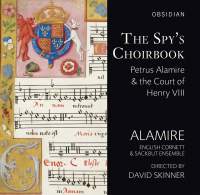Texte paru dans: / Appeared in: |
|
|
|
|
|
Reviewer: Barry
Brenesal The title is a bit of good marketing, catchy but irrelevant. Pierre Alamire’s spying activities are of no more importance to the manuscript scores that came out of his workshop than Kit Marlowe’s spying to his plays, or Giordano Bruno’s spying to his opaque metaphysics. What matters is a particular manuscript Alamire (baptismal name, likely Peter van den Hove; a la mi re is the hexachord for A, and a good sample of his wit) produced, and which now resides in the British Library as Royal MS 8.g.vii. It provides the content for this album. The manuscript is a typical collector’s piece from that autocrat of conspicuous consumption, Henry VIII. Alamire produced a large number of scores in his scriptorium, but the most sumptuous were brightly and airily illustrated manuscripts for royalty, featuring many of the leading Franco-Flemish composers of his day. As a pragmatic businessman, Alamire probably planned this choirbook produced in his Mechelen workshop initially as a gift for Louis XII and Anne of Brittany, and rededicated it to Henry VIII and Catherine of Aragon upon the death of Louis. At least, the evidence points that way: In Antoine de Févin’s motet Adiutorium nostrum the names Ludovicus and Anna are erased and rewritten as Henricus Rex and Katherina. It makes sense to have tried to fob the thing off on another buyer, and particularly this one. For whatever else might be said of Henry Tudor, he wouldn’t be outdone in the giving of gifts. The manuscript comprises 28 motets, six Latin secular pieces, and the so-called Garter canon that was added at a later date, and which isn’t recorded here. Like some of his contemporaries, Alamire did not supply composers’ names, but 20 of the pieces are known from inclusion in other sources. That leaves 14 that are anonymous unica. Alamire had excellent taste, or knew the excellent taste of his patrons, which amounts in this instance to the same thing; so that the anonymous pieces are not infrequently as fine an anything else in a collection that includes the likes of Mouton, Josquin, and de la Rue. A further curiosity of the choirbook is the inclusion of five successive settings of Dido’s last words from the Aeneid. David Skinner has chosen to involve the English Cornett & Sackbut Ensemble, as being representative of a truly extensive loud consort such as Henry VIII might have employed, or at least heard. On this album, they consist of three shawms, two trombones, a cornett, and slide trumpet. The argument for their use is most persuasive in the works for which only a text incipit is furnished, and where textures are more suited to instrumental recreation: Recordomini, and Iesus autem transiens. Elsewhere they provide textural variety; and occasionally, as in Févin’s Egregie Christi martir Christophore, they are used to double the voices for effect. Skinner avoids anything that could be called remotely anachronistic in richness, though with two discs whose lengths are 64:21 and 50:50, surely we could have been given both vocal and instrumental versions of such pieces as Congratulamini mihi omnes, even if the Easter responsory isn’t the most distinguished thing by far in the choirbook. (And they could have thrown in the Garter canon, too.) The performances by Skinner’s 15-person Alamire are attractive, with an emphasis on precision, carefully controlled dynamics, and clarity between the parts. Nothing is rushed. This Absalon fili mi allows the full weight of de la Rue’s circle of fifths to have its expressive effect, which was not the case in Stile Antico’s otherwise excellent recent release, From the Imperial Court: Music for the House of Hapsburg (Harmonia Mundi 807595). With the English Cornett & Sackbut Ensemble performing with its usual flair, this is a fine set that has been long overdue. | |
|
|
|
|
Cliquez l'un ou l'autre
bouton pour découvrir bien d'autres critiques de CD |
|




